Student Engagement

Teaching and learning at Mpala are critical priorities. Many international institutions, including Princeton, bring students for field-based coursework and student-led research. Learning at a venue like Mpala is invaluable since students have access to the necessary scientific infrastructure, a vibrant scholarly community, and a safe and comfortable setting.
Princeton’s Kenya semester in the field program began in 2006 with hands-on courses that include savanna ecology and community conservation, the natural history of mammals, global technology, restoration ecology and field ecohydrology.
Students may join research projects already underway at Mpala. Ongoing projects can be found here.
Student Engagement With Mpala
Become a Visiting Researcher
Over the years, Princeton Students have visited Mpala for undergraduate, graduate and postdoctoral research.
For Graduate and Post-doc research, please see below for a few guiding steps:
- Write a proposal outlining the proposed research to Mpala. It is recommended/easier to join an ongoing research project. Click here to view ongoing research.
- Request for an affiliation letter from Mpala. (Cost: $50)
- Obtain necessary Research Permits from the Kenyan Government in Nairobi (cost: $500) (renewable every year)- contact Dinah Ayoma (Research Compliance Officer) for assistance with obtaining permits
- Contact Cosmas Nzomo (Logistics Manager) to review your transportation, housing, vehicle, and research assistant needs at Mpala
Additional steps for a seamless research trip to Mpala include:
- Apply for a Kenyan Electronic Travel Authorization
- Enroll your trip and book your tickets through Concur
- Visit McCosh for relevant health information and vaccinations
- Order all equipment you will need in advance of your trip. Visit Princeton Prime Marketplace.
- Follow all travel guidelines at Princeton Travel
The High Meadows Environmental Institute (HMEI) Environmental Internship Program offers Princeton undergraduate students the opportunity to complement their academic course of study with hands-on research and project experiences during the summer months. HMEI internships are available with faculty-led research groups at Mpala.
Click here to learn more about the internship, availability and how to apply.
Mpala Research Centre is seeking Social Impact Fellows to work on a range of projects as they implement a new strategic plan. It is a very exciting time as we look to grow the impact and capability of Mpala. The Fellows will be responsible for assisting with these specific projects, but may be asked to participate in other Mpala-related projects as needed:
- Contributing to a review of Mpala's DEI policies and their relationship to Kenyan national laws.
- Assisting with events and forums to get the word out about Mpala at Princeton
Princeton Graduate Students interested in applying can visit the GradFutures website for more information.
Past Student Work at Mpala
Princeton students can find inspiration and support for their senior theses and Ph.D. dissertations from Mpala. Below are some examples of past research conducted by Princeton students.
- “Geochemistry and U-Pb Geochronology of Miocene and Cambrian-Precambrian Units at Mpala Research Center in Laikipia County, Kenya," Anna Pinkerton, 2024.
- “Understanding the Differences in How Grevy’s and Plains Zebras Interact with Cattle," Annika Hsi, 2023.
- “The Plot Thickens: Effects of Large Herbivore Exclusion on Understory Community Composition in an East African Savanna," Liana Slomka, 2023.
- “Ecosystem Engineers on Kenya’s Laikipia Plateau: Analyzing the Effects of Large Megafauna on the Ecohydrology of a Semi-arid Kenyan Savanna Landscape,” Noah Mihan, 2019.
- “Modeling Strongyle Parasite Infection Rates and Extinction Forces in African Equid Hosts,” Lindsay Martinez, 2019.
- “Ant-Plant-Hemipteran Interactions Between Non-Native Species in Laikipia, Kenya,” Nadeem Demian, 2019.
- “Reading Between the Lines: Zebra Stripes’ Adaptive Function in Anti-Parasite Defenses and Thermoregulation,” Lily Reisinger, 2018.
- “A Good Land is Hard to Find: The Effects of Land Degradation on Giraffe Social Structure in Central Kenya,” Kendall Bedford, 2017.
- “A Multifactorial Investigation of the Role of Water in Shaping Strongyle Parasite Burden Risk in Grevy’s and Plains Zebras," Laurel Easterling, 2017.
- “The Medicinal Plants of Mpala Ranch, Kenya: Distribution, Abundance, and Collection Efforts,” Amanda C. Marr, 1999.
- “The Community Ecology of Butterflies at Mpala Research Center, Kenya,” Johanna M. Kroenlein, 1996.
- “Origin and Evolutionary History of Culex Pipiens Complex Mosquitoes,” Yuki Haba, 2023.
- “Towards Better Representation of Water, CO2, and Temperature Exchanges at the Land-Atmosphere Interface,” Einara Zahn, 2023.
- “Agriculture in Flux, Biodiversity in the Balance: Conservation Implications of Cropland Expansion and Abandonment,” Christopher Lindsay Crawford, 2022.
- “The Evolutionary Potential of Host-Associated Microbiome,” Lucas Price Henry, 2022.
- “Foraging in a Variable World: Species Interactions Across Ecological Gradients," Matthew Craig Hutchinson, 2021.
- “The Mechanisms of Plant Interactions: To the Root of the Problem," Ciro Cabal, 2021.
- “Morphological Applications in the Physics-Ecology Interface in Dryland Soils,” Keita DeCarlo, 2019.
- “The Behavioral Ecology and Host-Parasite Dynamics of the Zebras of East Africa,” Kaia Juulia Tombak, 2019.
- “Patterns of Plant Defense, Diversity, and Fitness in an African Savanna," Tyler Clarke Coverdale, 2018.
- “Incidence and impacts of War-Driven Mammal Declines in African Ecosystems," Joshua H. Daskin, 2017.
- “Optimal Evasive Strategies for Groups of Interacting Agents with Motion Constraints,” William Lewis Scott, 2017.
- “From Fish Schools to Primate Societies: The Dynamics of Collective Movement in Animal Groups,” Ariana Strandburg-Peshkin, 2016.
- “The Effects of Early Social Context and Social Types on Dispersal and Reproductive Strategies in Male Geladas (Theropithecus gelada),” Caitlin Laurel Barale, 2014.
- “The Trials of Motherhood: Maternal Behavior Patterns and Antipredator Tactics in Thomson's Gazelle, a Hiding Ungulate,” Blair Allison Roberts, 2014.
- “Pastoralist Societies in Flux: The Impact of Ecology, Markets, and Governmental Assistance on the Mukugodo Maasai of Kenya,” Stephanie J. Hauck, 2013.
- “An Investigation into the Coupled Dynamics of Rainfall Climatology, Ecosystem Structure, and Biophysical Functionality,” Stephen Paul Good, 2013.
- “Adhesion and Interfacial Fracture: From Organic Light Emitting Devices and Photovoltaic Cells to Solar Lanterns for Developing Regions,” Tiffany Michelle Tong, 2012.


